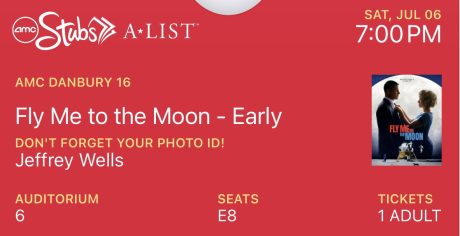Last night I caught Greg Berlanti‘s Fly Me To The Moon (Sony, 7.12) at a local AMC plex — a ticket buyer’s sneak preview so all embargo bets are off. Any negative reviews or social media tweets you might read are probably harsh and unfair for this is definitely a reasonably decent romantic confection with perky performances (except for Channing Tatum‘s), some agreeably snappy, above-average dialogue and…okay, somewhat clumsy third-act plotting but not in a catastrophic sense.
Written by Rose Gilroy, Bill Kirstein and Keenan Flynn, it’s a lightweight romcom riff on the alleged faking of the 1969 moon landing legend — a decades-old myth — by way of early ’60s Rock Hudson and Doris Day movies.
It has a jaunty, vaguely farcical tone while being both accurate and oddly inaccurate in recreating the America of 55 years ago. But it also offers a slice of that same nostalgic feeling of national pride that Todd Douglas Miller‘s Apollo 11 (’19) conveyed. So it leaves you with wholesome emotions and a nice aftertaste.
I went right home and re-watched Apollo 11 on Amazon….an absolutely first-rate, visually beautiful documentary sans narration or talking heade.

Scarlett Johansson‘s Kelly Jones is the star of the show — glamorously presented, hoarding most of the clever lines, registering serious emotion. She’s a bit like Doris Day‘s advertising executive in Lover Come Back (’61), only much more savvy and Don Draper-ish and therefore more of an exercise in 21st Century presentism as women generally didn’t wield that kind of power a half-century ago.
Jones is hired by Woody Harrelson‘s Moe Berkus (i.e., the conniving bad guy) to commercially market the Apollo program and later to secretly organize the shooting of a faked moon landing in case the Apollo 11 mission doesn’t succeeed or ends tragically.
Channing Tatum‘s Cole Davis is an uptight NASA bigwig with a crush on Jones, a fat broomstick up his ass, acute feelings of guilt over the January 1967 launchpad deaths of astronauts Gus Grissom, Ed White and Roger B. Chaffee, and a strong distaste for Jones’ marketing of the Apollo program. He’s basically playing a chump — a secondary character who mostly reacts to stuff that he finds angering, confounding or surprising.
If Fly Me To The Moon inspires you to re-watch Miller’s Apollo 11, as it did me, you might want to play a little game with yourself. There’s a whole lot of pre-launch footage of NASA technicians, VIP NASA guests, and Average Joe tourists waiting to see the launch. The name of the game is “Find the Obese People.” Because in 1969 they were all but nonexistent. You might spot one or two NASA technicians who could stand to exercise a bit more, but no Lizzo or John Candy types.
Among the almost entirely white throngs of Cocoa Beach tourists it’s really hard to find even a moderately fat person, and damn near impossible to spot any serious Jabbas. It’s just the way things were back then.
“Weltschmerz of ’69 vs. Insanity of Now“, posted on 7.13.19:
Apollo 11 is truly great within its own realm — an immersive, suspenseful, larger-than-life, clean-as-a-hound’s-tooth revisiting of a momentous moment in world history. It’s moving and majesterial and as tightly wound as a Swiss watch — i.e., all the boring parts of an eight-day voyage removed for viewing pleasure.
Apollo 11 gets you emotionally in at least a couple of ways. In hindsight it’s almost sad to watch when you consider how good and unified everyone in the U.S. felt when the Eagle landed on the moon on 7.20.69. That feeling is gone for good now.
True, things were anything but peaceful in the summer of ’69 — the Vietnam War raging, the “silent majority” discomforted by anti-war demonstrations and a general loathing of President Richard Nixon plus counter-culture upheavals (pot, LSD, hippies, the Weathermen, Black Panthers, “whitey on the moon”, Woodstock, breakup of the Beatles). So life is never peaceful and strife and discomfort are often the orders of the day.
Nixon was a dark character but he wasn’t MAGA crazy. For all his dark currents and venal determinations Nixon at least understood and respected the system of checks and balances for the most part and, apart from “the plumbers”, generally operated within constitutional restraints. And he did push for environmental laws, a national health care system and the raising of labor wages. Five years ago Noam Chomsky opined that Nixon was “the last liberal president.”
As disturbing and discordant as 1969 was, it was a comparative garden of eden compared to what’s happening now.
